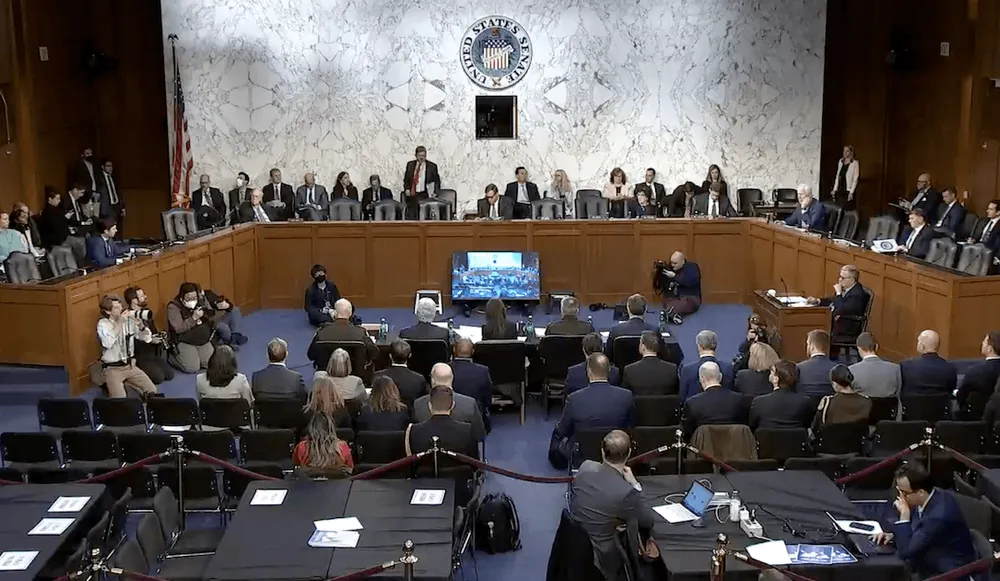Supporters of surveillance law must 'lean in' to transparency, Sen. Warner says
The chair of the Senate Intelligence Committee on Wednesday repeatedly urged U.S. intelligence leaders to show “courage” in their campaign to renew an expiring surveillance law, warning that a lack of transparency with the American public and dubious policymakers could sink the effort.
Last week the Biden administration launched its push for reauthorization of Section 702 of the Foreign Intelligence Surveillance Act, which allows the National Security Agency to intercept without a warrant the digital traffic of overseas targets, but also incidentally vacuums up the personal information on an unknown number of Americans. The statute — which officials say protects U.S. citizens from cyberattacks, terrorists, drug traffickers and other threats — is slated to expire at the end of the year.
“I personally believe [in] the value of 702, but we're going to have to lean in on being willing to have the same kind of courage of declassification” about the spying program’s value in order to make the case for its renewal to the public and “skeptical members of Congress,” said Sen. Mark Warner (D-Va.). He noted the intelligence sharing that took place prior to Russia’s invasion of Ukraine as an example.
He later said committee members want to “help” make the argument to extend the program but warned the positive relationship between the two sides would be endangered if the spy chiefs aren’t cooperative. Panel members have been dissatisfied with the communication about classified documents found at the homes of President Joe Biden, former President Donald Trump and former Vice President Mike Pence.
“That is not the kind of collaboration, cooperation that we expect and it will tie and restrain our ability to kind of make this kind of trusting relationship with the non-members of this committee on issues like 702,” Warner said during the committee’s annual worldwide threats hearing.”I want to be loud and clear on that, and I can assure you there's not a member on this committee, doesn't matter which side of the dais they sit, that doesn't believe that.”
Director of National Intelligence Avril Haines and the other intelligence leaders at the public session used it to emphasize the program’s importance and attempt to allay concerns about its use.
“It is hard to overestimate, frankly, the importance of this authority to our work across the board,” Haines told lawmakers, saying it “provides unique intelligence on foreign intelligence targets at a speed and reliability that we cannot replicate with any other authority.” Haines and Attorney General Merrick Garland sent a letter last week to Congress urging reauthorization.
FBI Director Christopher Wray — whose agency has come under some of the most intense scrutiny about the program because its analysts can search a portion of the 702 database without a warrant — said there had been a 93% year-over-year drop in so-called “U.S. person queries," the term for searches of information about Americans in the massive repository.
Wray did not provide a specific figure to compare it against. There were 3.4 million estimated searches conducted in 2021.
Wray called the program “absolutely essential” to protect Americans and said he and the NSA's director, Army Gen. Paul Nakasone, “take very seriously our role as stewards of these important authorities.”
He also rattled off a number of steps the bureau has undertaken since the law was last renewed in early 2018, including an internal audit office devoted to FISA compliance and enhanced training and approval processes. The program faced increasing restrictions ever since former NSA contractor Edward Snowden leaked classified details about a decade ago.
Warner acknowledged that “a lot has changed,” in terms of reforms, since Congress last debated the statute in 2017.
“We're going to push you to declassify more information, so that we can again convince the American public and for that matter, convince the … 83 colleagues … who are not on this committee,” he said.
Martin Matishak
is the senior cybersecurity reporter for The Record. Prior to joining Recorded Future News in 2021, he spent more than five years at Politico, where he covered digital and national security developments across Capitol Hill, the Pentagon and the U.S. intelligence community. He previously was a reporter at The Hill, National Journal Group and Inside Washington Publishers.



